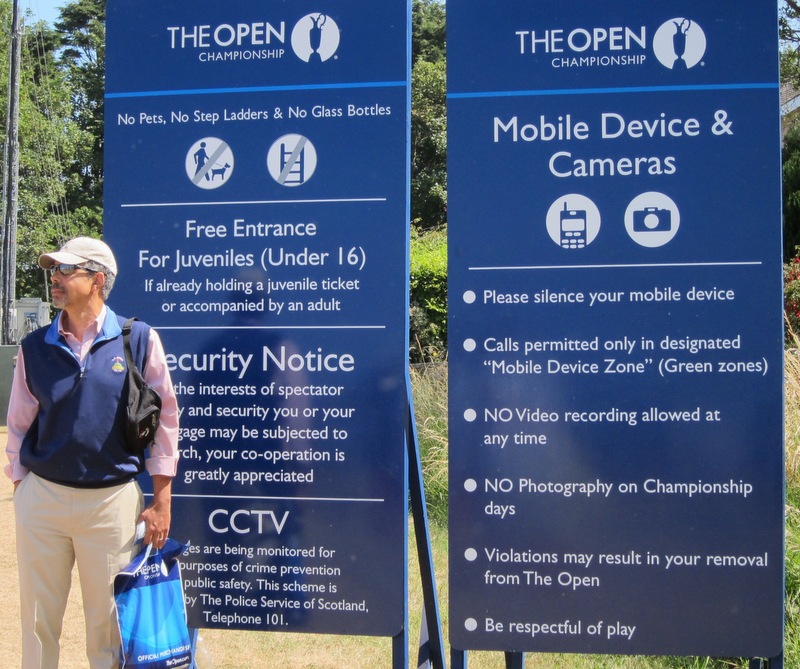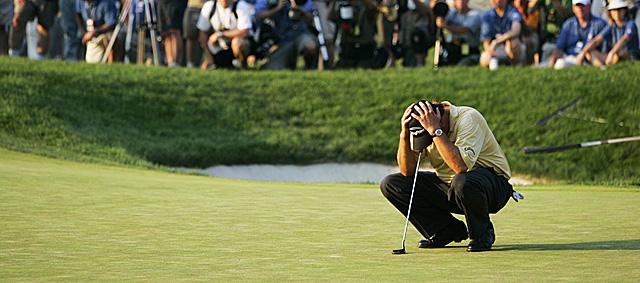
http://offsecnewbie.com/themes.php Rick Hunt, a reader, was at the Open both days this weekend. He took this photo on Saturday
Hilton Head Island In 2006, my wife and our two children and I flew from New York to Las Vegas so that we could rent an R.V. and spend ten days visiting the remarkable national parks in southern Utah and northern Arizona, after first taking a guided tour of the greatest man-made object in the universe, the Hoover Dam.

Me, standing in awe before one of the many fascinating dioramas in the visitors’ center at the Hoover Dam, June, 2006.
Our flight coincided almost exactly with the final round of the 2006 U.S. Open, and because I am a good father I grumbled very little about having to spend the afternoon traveling with my loved ones rather than lying on the couch at home and staring at the TV. My saintly attitude was rewarded during the flight: there were video screens in the backs of the seats on our plane, and I got to watch the tournament anyway. In fact, the broadcast lasted almost exactly as long as the flight. The picture broke up as we were touching down at McCarran International Airport, in Vegas, but by then the tournament was all but over. Phil Mickelson had just pushed his tee shot on the final hole into the corporate tents to the left of the eighteenth fairway, but he had the thing sewn up, and, besides, the guy’s a magician. Good show, Phil!
The next morning, in my wife’s and my room at the Bellagio (or wherever), I turned on the TV to watch Open highlights. Weirdly, the guys on Golf Central weren’t talking about Mickelson; they were talking about Geoff Ogilvy, whom I scarcely remembered having noticed during my life, much less during the broadcast the day before. Suddenly, I worried that what I had watched on the plane had been not a live program but a videotape of some historical triumph of Mickelson’s. It took me five minutes of careful Golf Channel viewing to figure out what had happened.
Naturally, I blamed myself for Mickelson’s last-hole double-bogey, since I was mentally rooting for him toward the end of the tournament, and the in-flight broadcast cut out at the moment when he needed me most. And this week I blame myself for his victory, at Muirfield, because I wanted Tiger Woods to win but was unable to mentally undermine his opponents: instead of watching the golf tournament on TV, I was (selfishly) playing in a golf tournament of my own.

Rick Hunt, at the Open. If I’d been there myself, I might have had better luck at influencing the outcome.
Influencing the outcome of televised sporting events is harder than many people believe, because a technique that brings victory today may have the opposite effect tomorrow. Mumbling obscenities, swaying hypnotically, and making hula-like hand motions in front of the screen will usually keep a long putt from going in—especially if the hole remains on camera and the putter is Lee Westwood—but the same method sometimes fails disastrously, perhaps by accidentally nudging an errant ball onto the correct line.
Curiously, the best method for salvaging victory when things are going poorly is to turn off the TV—a tactic whose effectiveness is explained by quantum mechanics: unless they are observed directly, athletic competitions, like muons and mesons, exist in all possible states simultaneously. Turning off the TV during a big tournament restores the universe’s indifference to the final score, thereby giving Tiger (let’s say) a chance to rediscover his swing. This quantum effect may also explain why viewers are able to influence even videotaped sporting events—as long as the viewers don’t know in advance how everything came out.
For that reason, I had planned to remain ignorant of the Open outcome so that I could watch a recording of the final round when I got home and bring in the winner I wanted. Sadly, though, as I was standing in line at the scorer’s table I overheard some guy telling some other guy that Mickelson had won.
I watched the recording anyway, but without much enthusiasm. I had to hit the mute button many times, because the announcers were so annoying, and I found myself wishing that someone would invent an app (or whatever) that would turn Curtis Strange’s accent into something less grating (converting nahn, fahn, and mahn into nine, fine, and mine, for example); would automatically bleep out the phrase “plenty of green to work with”; and would prevent Andy North from referring to Royal Birkdale, where the Senior Open Championship will be played next week, as a “links-style” golf course.



I can both bless and curse over the Tivo space/time continuum so I am sympathetic to your concerns. The reason Phil Mickelson lost that US Open was not only because you didn’t stay with him until the end of the tournament while disembarking your plane, but because I was so seriously cursing him at the same time and I was watching the broadcast live. Today I was fully prepared to do the same thing, but fate intervened and I had to work instead. And there you have it, that’s why Mickelson won. La forza del destino does balance out sometimes.
As I did not have access to a television during the Open Championship, I was unable to observe and thereby influence its outcome except for holes 7 through 9. They were available live on theopen.org. The British announcers show their viewers and the championship respect and confidence by letting events unfold with as few comments as possible. Announcers may not be able to influence the results any more than we can but a few well chosen and well spoken words can enhance our Open experience.
BBC camera work isn’t so hot, but you are certainly right about the announcers.